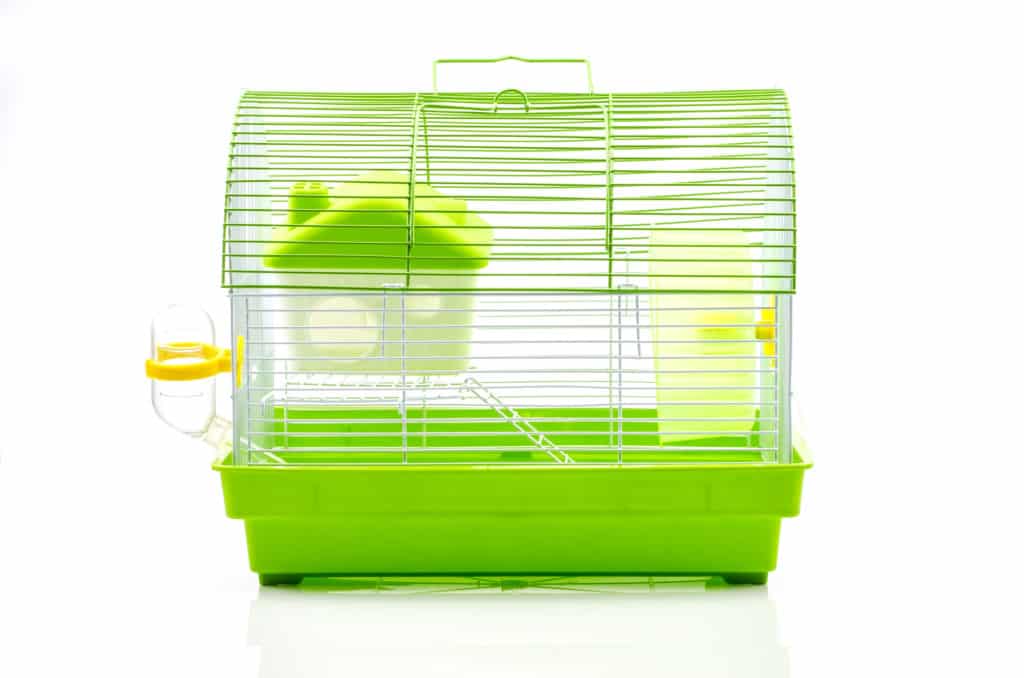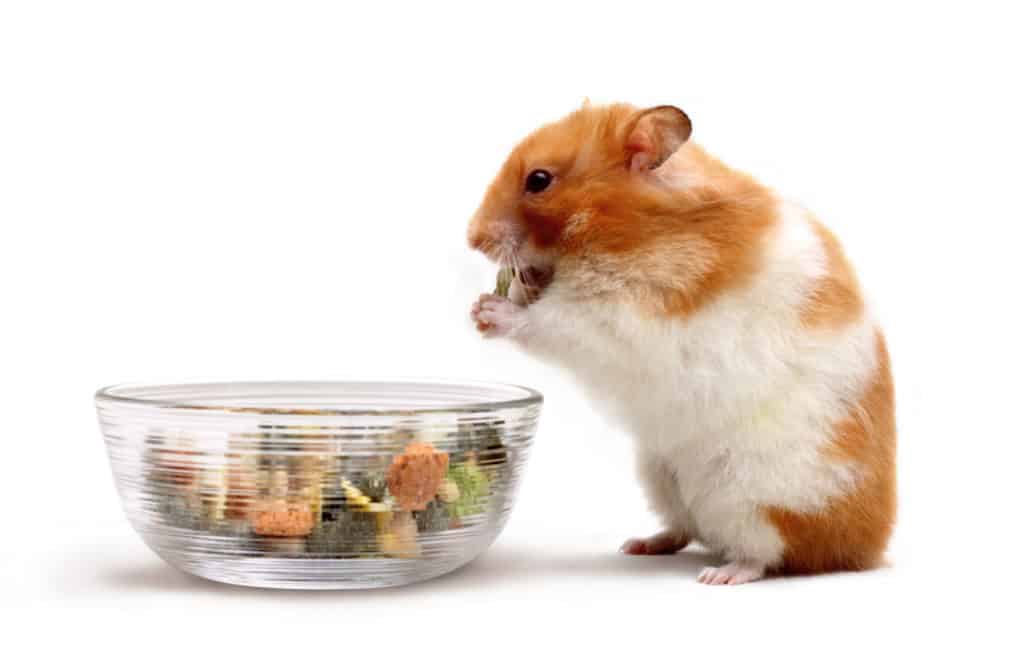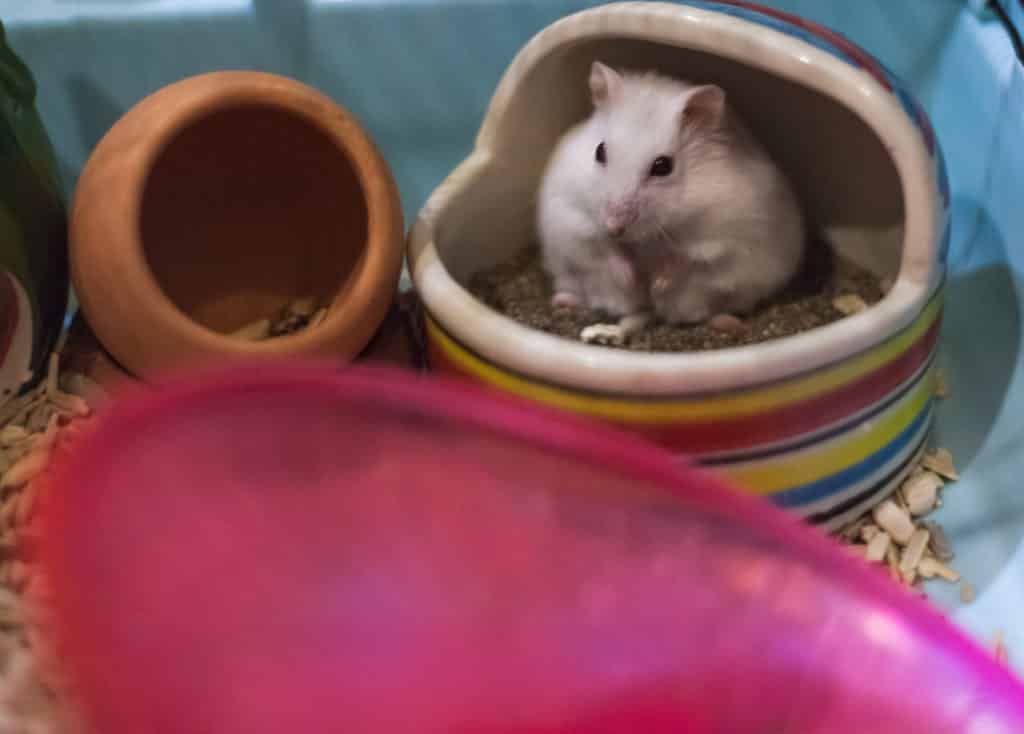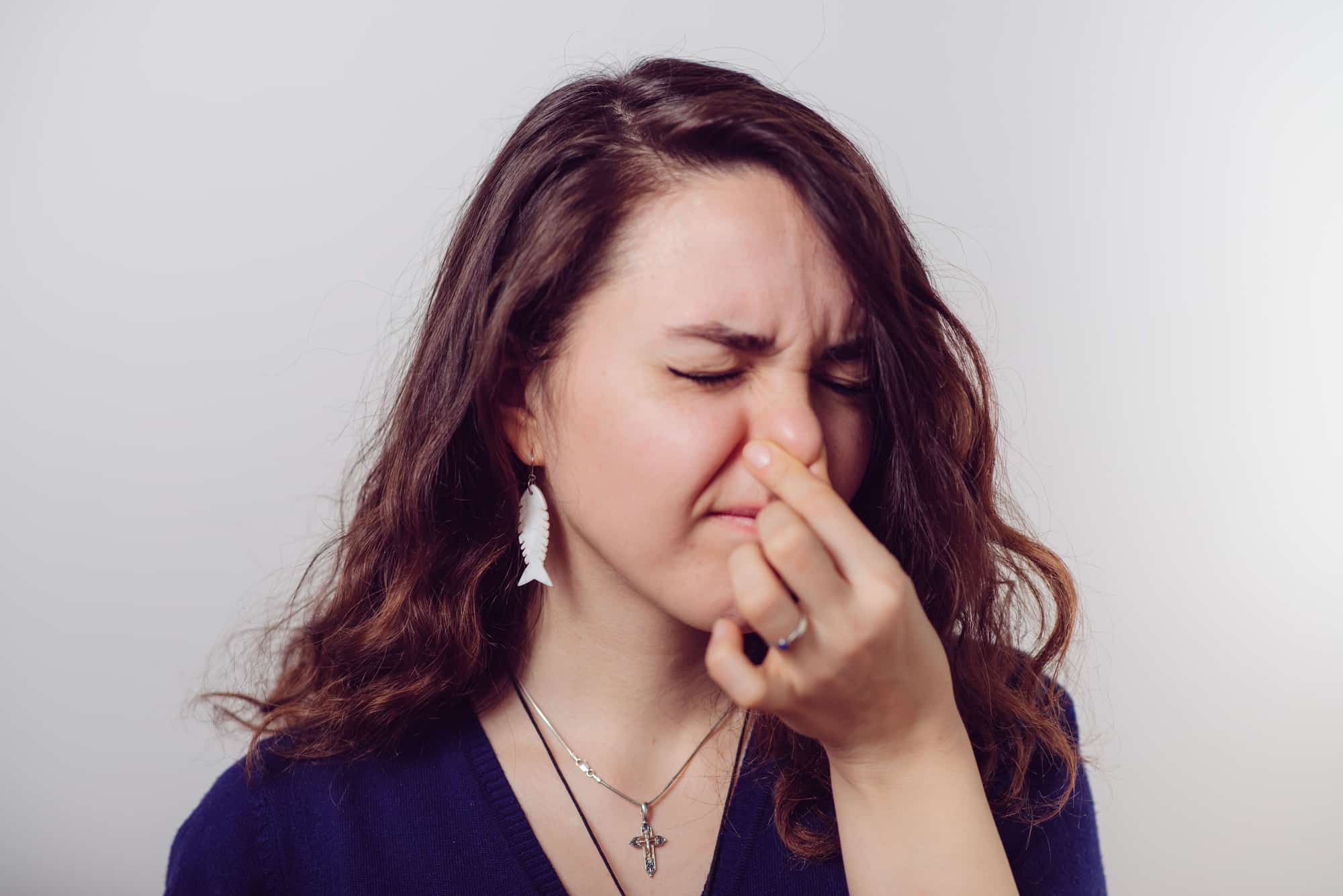Hamsters, in general, do not smell bad. They are creatures that like to clean themselves meticulously and keep themselves free of any scents.
Hamsters are located towards the bottom of the food chain due to their small size, which makes them weaker than most predators. And since many predators have a good sense of smell, hamsters cannot afford to stink because their foul smell will reveal their location. So, they clean themselves meticulously, trying to rid themselves of any scents. Therefore hamsters do not smell bad.
Hence, if your hamster stinks, it is not normal. The foul smell might be the result of one of the following reasons.
- Do hamsters stink? Reasons behind your hamster's foul smell
- Reason 1: An unclean hamster cage
- Reason 2: A wrong hamster cage
- Reason 3: Wrong type of bedding or insufficient amount of bedding
- Reason 4: Hidden stashes of food
- Reason 5: Smelly fur
- Reason 6: An unclean hamster
- Reason 7: A sick hamster
- Reason 8: Hamster's diet
- Reason 9: Smelly toilet
- Reason 10: A hamster that urinates everywhere
- Reason 11: Scent glands
- Reason 12: An ovulating female hamster
- Reason 13: Less ventilation
- Summary
Do hamsters stink? Reasons behind your hamster’s foul smell
Reason 1: An unclean hamster cage
Hamsters are generally considered low-maintenance pets. But even hamsters need to be taken care of properly.

Why does my hamster’s cage smell bad?
The cage is where your hamster eats, plays, sleeps, urinates, and defecates. So, besides taking care of his diet, you should also clean his cage regularly. If not, the cage will start to stink with time.
Solution:
Remove feces and any uneaten food from the cage every day. Soiled bedding (bedding that comes in contact with urine or fecal matter) can not only stink but can also serve as a breeding place for germs. So, remove soiled bedding every day.
In addition to that, clean the cage with soap and water once a week (Source: Animals.mom). If cleaning once a week doesn’t eliminate the smell, clean it more often.
Reason 2: A wrong hamster cage
If the hamster cage is made of wood that absorbs fluids, the floor (of the cage) might absorb the urine that soaks to the bottom. And once the urine dries, it will start to stink.
As the amount of urine accumulates over time, the smell will intensify. Then, even if you clean the cage, the smell will not go away.
Solution:
Choose an aquarium or a bin cage instead of a wooden cage (Source: Famillypet).
If the bedding is thick enough, the urine will not be able to reach the cage’s floor. So, if you decide to buy a wooden cage, choose one that is large enough to accommodate at least 12 inches of bedding.
At least once a month, clean the cage with a mixture of vinegar and water. This will remove harmful microorganisms, which might not only cause a foul smell but also make your hamster sick. Keep your hamster in a safe place while you clean the cage. After you finish cleaning, dry the cage properly before putting your hamster in again.
Reason 3: Wrong type of bedding or insufficient amount of bedding
Sometimes, it is neither the hamster nor the cage that gives off the bad smell, but the bedding. This might be because of the wrong choice of bedding. Not changing the bedding often enough can also produce a bad smell.
Solution:
As said before, if the urine soaks to the cage’s wooden floor, it will start smelling bad. So, use a thick layer of bedding. Bedding that is at least 12 inches thick will absorb the urine and prevent it from soaking to the cage’s floor.
But just as the amount of bedding matters, the material with which it is made matters too. Wood shavings, paper, and hay are all absorbent (Source: Wikipedia). So they can absorb urine. However, wood shavings may contain dust and aromatic oils that could cause health problems for some hamsters. Hay is absorbent as well, but when soiled, it can quickly decompose and start to stink. Paper, too, is absorbent. In addition to that, it contains no dust or aromatic oils. Therefore, it is healthy for your hamster. The only problem is that it might start to stink when saturated with water or urine. So, the best bedding to use is paper bedding. But replace it once a week or so, so that it doesn’t get saturated with urine.
Never buy scented beddings to mask the urine smell. Hamsters have a strong sense of smell, and if you use scented beddings, it might stress them out.
Reason 4: Hidden stashes of food
It is the natural instinct of a hamster to carry food in its pouches and store it in a safe place. But if a hamster stores fresh food in its cage, it will rot and soon create a foul smell.
Solution:
Every day, check your hamster’s cage to find out if he has stored fresh food secretly. If he has indeed stored fresh food, remove them promptly.
Reason 5: Smelly fur
This is more common in Syrian hamsters than dwarf hamsters. Since Syrian hamsters have long hair, waste (food items, fecal matter, etc.) can easily get trapped in their fur. If left unchecked, their fur will start to smell.
Solution:
Use a pet brush to comb your hamster’s fur regularly and get rid of the waste pieces that might have stuck to his fur. If that doesn’t get rid of the foul smell emanating from his fur, trim the fur.
If hamsters catch a cold, it might prove deadly for them. So, never bathe your hamster or use water to clean him, regardless of how smelly he gets.
Reason 6: An unclean hamster
Even though hamsters are creatures that clean themselves meticulously, there might come a time when your hamster stops grooming himself. If that happens, the oils that his body secretes will start to accumulate in his fur. His fur might also be stained with urine. As a result, he will start to stink.
Solution:
There could be two reasons for the above problem:
- Your hamster is too stressed.
- Your hamster has hurt himself (probably a fracture). So he is not able to take sand baths and clean himself properly.
Hamsters, especially Syrian hamsters, are solitary and territorial creatures. So, if you have another hamster in the same room, they will want to fight each other and kick the other one out. But if they can’t fight each other because the other hamster is in another cage in the same room, they will get stressed. If you have another pet in the same room, like a dog, which is a hamster’s predator, it might stress your hamster out as well. So, if you have more than one hamster (especially Syrian hamsters), keep them in separate rooms. If you have another pet, keep him in another room.
If your hamster doesn’t appear to be stressed, then he might have hurt himself. Take him to a veterinary doctor to find out why he doesn’t groom himself.
Reason 7: A sick hamster
My hamster smells like pee. What should I do?
There could be many reasons why your hamster smells like pee. Maybe, his fur is too long, and his urine sticks to his fur. Or maybe, it is not your hamster that stinks, but the cage.
Yet, one of the reasons why your hamster might smell like pee is if he is sick.
Solution:
Two particular illnesses can make your hamster stink. The second one mentioned here can make him smell like pee.
- Diarrhea – If your hamster has diarrhea, his tail will be soaked in wet stool. If you find fecal matter sticking to his tail or fur, then your hamster might be suffering from diarrhea. In this case, you should take your hamster to a veterinary doctor immediately. If not, your hamster will dehydrate, which can quickly become life-threatening.
- Bladder problem – If your hamster has a bladder problem, his fur might be soaked with foul-smelling urine. If this is the case, take him to a veterinary doctor.
Reason 8: Hamster’s diet
The food you give your hamster can also be the reason for his foul smell.

Flatulence (passing gas) is not something that is exclusive to humans. Almost all mammals fart (Source: Vox). When we eat food, the microbes in our gut break down the food molecules and produce gases (Carbon-dioxide, Methane, etc.) as by-products. These by-products come out of our bodies as gas.
Fibrous plant products, like beans, vegetables, grains, etc., produce foul-smelling gas when broken down by gut bacteria. Red meat can also produce foul-smelling gas when broken down because it contains sulfur and some other chemicals that can stink.
So, if your hamster stinks bad after eating food, it might just be passing gas.
Solution:
Farting is a normal healthy phenomenon. But certain foods can produce smelly farts (Source: BBC). So, if your hamster’s farts get smelly, avoid the following food items:
- Fatty foods, especially fatty meat like pork and beef (They produce hydrogen sulfide, which smells like rotten eggs, when broken down)
- Beans and lentils (They contain lots of fibers and produce hydrogen, methane, and sulfur gases when broken down)
- Dairy products (They can make your hamster bloated and gassy, particularly if your hamster is lactose intolerant)
- Cabbage, cauliflower, broccoli, kale, and sprouts (They contain fibers that produce sulfur when broken down)
- Fruits like mango, apple, and pears (They contain a sugar called fructose that is not easily broken down in the gut. So, your hamster might get gassy after eating such fruits.)
- Sugary foods and acidic foods
The safe foods for hamsters are the commercial hamster pellets available in pet stores as well as seeds, fresh vegetables, fresh fruits, and some herbs. (Refer to our hamster guide to find out which foods are safe for your hamster and which aren’t.)
Reason 9: Smelly toilet
Wild hamsters don’t urinate in their burrows. Instead, they urinate outside, farther away from their burrows. After all, many predators have excellent smelling sense, and if a hamster urinates in his own burrow, any predator can follow the smell and find him. Moreover, the stench might be too much for a hamster to tolerate since he himself has an excellent smelling sense. So, wild hamsters urinate outside their burrows.
Your pet hamster, too, will do the same. He will never pee in his own nest or hideout. Instead he will urinate in a place that is farthest away from his hideout. Normally, it will be one of the corners of the cage.
Generally, it’s the hamster’s pee corner (toilet) that creates the awful smell. A hamster’s poop is just dry droppings. So, it doesn’t smell as bad as the urine unless your hamster has eaten something that makes his poop smell bad. Hence, if you don’t promptly remove the bedding where your hamster has urinated, it will keep stinking. The urine could also seep to the bottom and deposit on the floor of the cage, and if you have a wooden cage, the floor will absorb the urine and start stinking permanently.
Solution:
Every day, you have to promptly remove the bedding under your hamster’s pee area. Generally, your hamster’s pee area will be located at one of the corners of the cage. But even if you don’t know which corner it is, you can easily find out.
Hamsters are creatures of habit. So, they will choose the same corner every day to urinate. Watch where your hamster goes after he wakes up. He will most probably go to the same corner to pee. You can also find this corner by looking for any wet spots on the bedding or looking for its foul smell. You should then remove the bedding in this area and replace it with new bedding every day.
Reason 10: A hamster that urinates everywhere
Generally, hamsters are creatures of habit. So, they will choose the same place every time to urinate. But there could also be instances where the hamster urinates and poops everywhere around the cage. If that’s the case, you will not be able to keep track of where your hamster urinates every time and promptly remove the bedding there. Consequently, the entire cage will start stinking.
Solution:
You should first potty train your hamster to use a specific place to pee.

How to potty train your hamster?
- You can buy a plastic hamster potty available commercially and fill it with sand (Source: Hamster guru). Sand is an attractive substance for a hamster because it can dig into it. So, your hamster will naturally be attracted to the potty if you fill it with sand.
- You can also add some hamster litter like paper, etc., to it to make it even more appealing.
- You can add some soiled bedding to it so that it smells of hamster urine. But you must remove the soiled bedding from the rest of the cage beforehand so that the urine smell doesn’t come from anywhere else. If not, it could confuse your hamster.
- You can also give a treat to your hamster every time he uses the hamster potty.
All these steps will encourage your hamster to use only the hamster potty to pee.
However, if you have an old hamster that has memory issues, he might sleep on his own urine and smell bad. In that case, you should take your hamster to a vet to figure out a way to solve the problem.
Reason 11: Scent glands
Humans mainly communicate using sound (speech) and actions (especially in the case of mute people). Besides these main forms of communication, we also subconsciously display our intent to people using our body language.
Similar to humans, most mammals can use sound to communicate with each other. In addition to that, many mammals like hamsters can also use pheromones to communicate with each other.
A pheromone is a chemical produced by one individual that invokes a response in another individual of the same species. It can be used to communicate aggression, sexual availability, a sense of alarm (indicating a threat), etc. The pheromones of a hamster are present in its saliva, urine, vaginal secretions, and feces. Besides these, hamsters also have scent glands on their ear, behind their eyeballs, on their flanks, and on their feet that can produce pheromones.
A hamster often rubs his scent glands, especially the ones on his flanks, on objects to mark his territory. Humans are not able to smell pheromones as much as other mammals. So, in normal cases, you won’t be able to smell your hamster’s pheromones. But sometimes, you may be able to smell the pheromones of your hamster.
Solution:
If you smell a strong musky scent coming from your hamster’s cage, it might just be the result of your hamster marking his territory. This doesn’t mean your hamster is sick. This is a normal occurrence in a hamster, and hence, you don’t have to worry about it.
But you should always keep an eye on your hamster’s scent glands to make sure that they don’t get infected. If the scent glands show signs of inflammation or become red, if they start bleeding, if they suddenly discharge a fluid, or if your hamster suddenly shows reluctance to your touch, take your hamster to a veterinary doctor.
Reason 12: An ovulating female hamster
Hamsters ovulate every four days for several hours (Source: Animals.mom). Ovulating female hamsters are said to be in heat or in season. During this time, a white discharge could come out of their genital areas.
As you already know, hamsters (especially Syrian hamsters) are highly territorial. They live alone in their own territory. But to mate, a female hamster needs a male hamster. So, to attract male hamsters, a lonely female would leave this white discharge (which smells awful) outside her burrow, in the nearby bushes. Male hamsters then use their incredible sense of smell to follow the scent and find her burrow.
Why does my female hamster smell so bad?
So, if your young female hamster smells bad all of a sudden and the smell goes away with time, she might be ovulating.
Solution:
Ovulation is a normal biological occurrence for female hamsters. So, this smell is nothing to be worried about. But if the smell disturbs you, you can remove the white discharge with a tissue and then flush the tissue. Removing the white discharge will reduce the severity of the smell.
But sometimes, removing the white discharge may not reduce the smell in the room if your hamster herself smells bad when in heat. In such cases, you can carefully pick her up and place her on a flat surface. Then, gently pet her back near the base of her tail with your fingers. If you do that, she will stand still. Then, you can clean her bottom and get rid of the foul smell (Source: Bechewy).
Reason 13: Less ventilation
If you have placed your hamster’s cage in a cramped room, even the faint smells produced by the hamster or the cage will linger in the room for a long time.
Solution:
Keep your hamster’s cage in a room with good ventilation. But make sure that the room’s temperature lies between 18°C and 24°C range, which is the optimal temperature range for a hamster.
Want to learn more about your hamster and its behavior? Check out our guide on hamsters.
Summary
Are hamsters supposed to smell?
Hamsters are clean animals. They clean themselves meticulously to get rid of any scents that they might have. This habit helps them survive in the wild by preventing predators from following their scent and catching them. So, hamsters are not supposed to smell. But if your hamster smells bad, it could be because of one of the following reasons:
- You don’t clean your hamster cage properly or regularly
- You have bought the wrong hamster cage
- You have laid out the wrong bedding for your hamster, or the bedding is not sufficient
- Your hamster stores hidden stashes of food that rots and creates the foul smell
- Your hamster has a long fur, to which waste items stick and start stinking
- Your hamster doesn’t clean itself properly because of injury or stress
- Your hamster is sick
- Your hamster’s diet includes food items that can produce smelly gases when broken down
- You don’t remove soiled bedding promptly from the cage
- You haven’t potty trained your hamsters, and so it urinates everywhere around the cage
- Your hamster’s pheromones produce the smell
- Your female hamster is in heat
- Your hamster’s room is not properly ventilated
How to get rid of hamster smell?
To get rid of your hamster’s smell, you should first find out why your hamster smells. Then, you can take the proper measures to rid your hamster of the foul smell.



